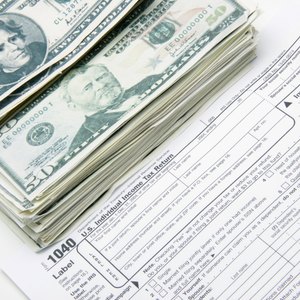
It's a myth that everyone is required to file an income tax return. The IRS may not ask you to file a return for 2020 based on your filing status and income. However, the fact that you may not be required to file doesn't mean that there aren't some benefits to filing that you should know about.
So, do you have to file if you only earned $700 in income this year? Take a look at the filing rules to find out.
Will You Need to File Taxes After Earning $700?
Generally, you aren't required to file an income tax return if you only made $700 in wages this year. However, there are exceptions. Here's a look:
- You were self-employed in the current tax year.
- You generated substantial income from other sources like your retirement distributions or investments.
- You earned a significant "barter" income.
- Your status is married filing separately (through 2025).
Read More: Deadlines to Submit Tax Returns
Anyone with a status of married filing separately will need to file a return if they make just $5 in a year. This is a new update stemming from the Tax Cuts and Jobs Act of 2017 that will be in effect until 2025. In addition, extra earning streams could put you over that $700 threshold for filing a return even if you earned $0 in wages or salary.
While earning self-employment income is on the list of reasons to file a return this year, this category is a bit nuanced. You actually only technically have to file a return for self-employment income if your net earnings from self-employment total $400 or more in a year. If you need help figuring out if you're required to file this year, you can use the "Do I Need to File a Return?" tool from the IRS here.
Looking at Filing Thresholds
If you made $700 this year, you have a pretty big buffer between your income level and the filing threshold for every status other than married filing separately.
For single filers under age 65, the threshold is $12,400. That jumps to $14,050 for single filers under the age of 65. For married filing jointly, the number is $24,800 if at least one spouse is under the age of 65, and that jumps to $27,400 if both spouses are over 65. The numbers for head of household are $18,650 (under 65) and $20,300 (over 65).
Read More: Does the IRS Check Each & Every Tax Return Filed?
Do You Need to File If Your Stimulus Check Pushed Your Income Over $700?
No, you don't have to add the $1,200 you received to your total income for 2020. This applies even if you earn above the $700 threshold. The stimulus checks are considered nontaxable payments that don't count toward total annual income.
Should You Still File a Tax Return When You Only Made $700 This Year?
While you're not required to file in most cases, you still might want to consider filing. You may be eligible for deductions or credits that could earn you a refund. You should also consider filing if you had taxes withheld from your wages. There's really nothing to lose if you'll only be filing a simple return that doesn't take much time to complete.
Read More: How to Check an IRS Tax Return
References
- IRS: Publication 501 (2019), Dependents, Standard Deduction, and Filing Information
- IRS: Self-Employed Individuals Tax Center
- IRS: Do I Need to File a Tax Return?
- Internal Revenue Service. "The Agency, its Mission and Statutory Authority." Accessed Jan. 26, 2020.
- Internal Revenue Service. "Publication 501: Dependents, Standard Deduction, and Filing Information," Page 2. Accessed Jan. 25, 2020.
- Internal Revenue Service. "Publication 501: Dependents, Standard Deduction, and Filing Information," Pages 2-9. Accessed Jan. 25, 2020.
- Internal Revenue Service. "Publication 501: Dependents, Standard Deduction, and Filing Information," Page 5. Accessed Jan. 25, 2020.
- Internal Revenue Service. "Individual Taxpayer Identification Number." Accessed Jan. 26, 2020.
- Internal Revenue Service. "Publication 501: Dependents, Standard Deduction, and Filing Information," Pages 2, 6. Accessed Jan. 25, 2020.
- Internal Revenue Service. "Publication 501: Dependents, Standard Deduction, and Filing Information," Pages 8-9. Accessed Jan. 25, 2020.
- Internal Revenue Service. "Publication 501: Dependents, Standard Deduction, and Filing Information," Page 6. Accessed Jan. 25, 2020.
- Internal Revenue Service. "Publication 501: Dependents, Standard Deduction, and Filing Information," Page 7. Accessed Jan. 25, 2020.
- Internal Revenue Service. "Publication 501: Dependents, Standard Deduction, and Filing Information," Page 9. Accessed Jan. 25, 2020.
- Internal Revenue Service. "Revenue Procedure 2018-57," Pages 8-9. Accessed Feb. 17, 2020.
- Internal Revenue Service. "IRS provides tax inflation adjustments for tax year 2019." Accessed Feb. 17, 2020.
- Internal Revenue Service. "Form 1040," Pages 1-2. Accessed Feb. 17, 2020.
- Internal Revenue Service. "About Form 1040." Accessed Jan. 26, 2020.
- Internal Revenue Service. "Schedule C: Profit or Loss From Business," Pages 1-2. Accessed Feb. 17, 2020.
- Internal Revenue Service. "About Schedule C (Form 1040), Profit or Loss from Business (Sole Proprietorship)." Accessed Jan. 26, 2020.
- Internal Revenue Service. "Instructions for Form 1065 (2019)," Pages 1-3. Accessed Jan. 26, 2020.
- Internal Revenue Service. "Instructions for Form 1120 (2018)," Pages 1-2. Accessed Jan. 26, 2020.
Writer Bio
Adam Luehrs is a writer during the day and a voracious reader at night. He focuses mostly on finance writing and has a passion for real estate, credit card deals, and investing.

